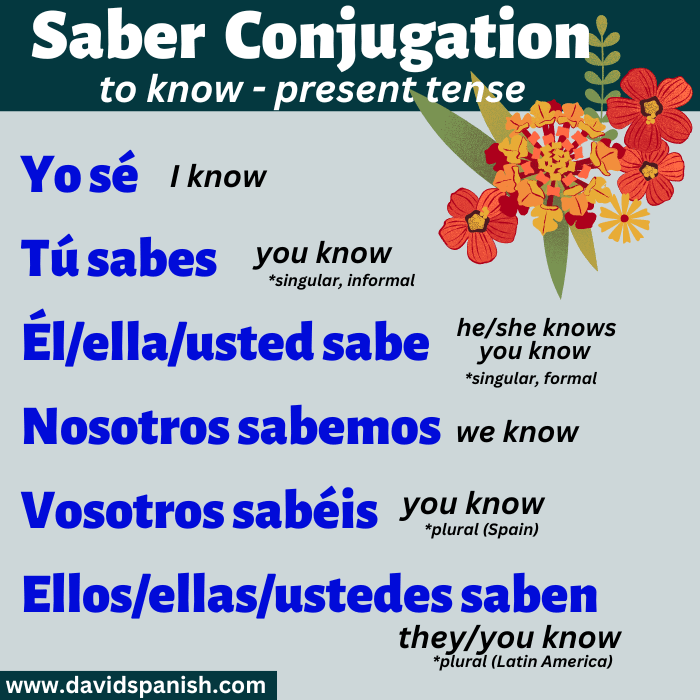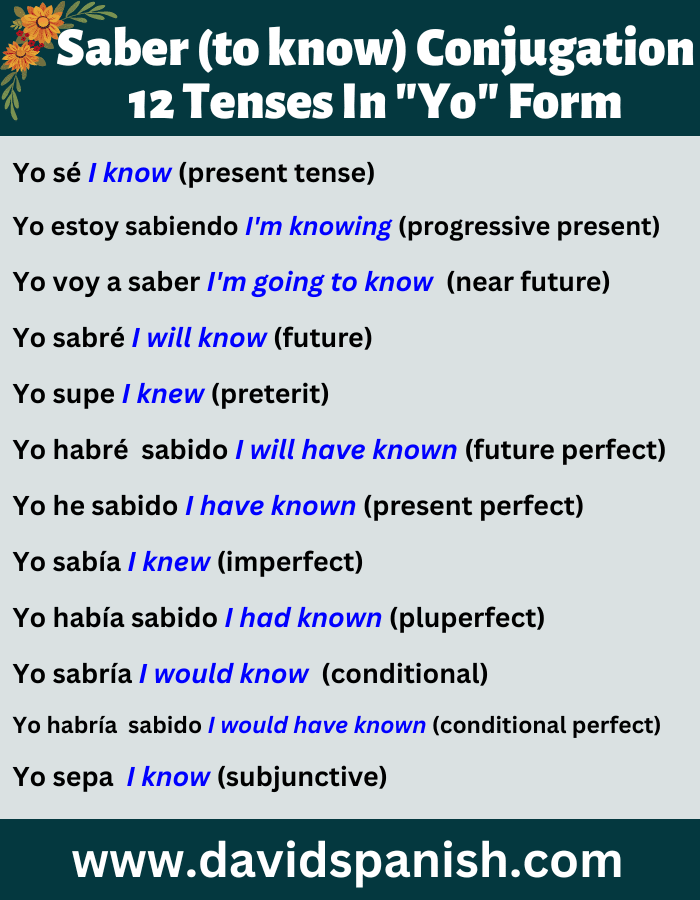The Spanish verb saber means “to know” in the the context of factually knowing. The conjugation of saber in the present tense is: Yo sé (I know), tú sabes (you know), él/ella/usted sabe (he/she knows; you know), nosotros sabemos (we know), vosotros sabéis (you know) and ellos/ellas/ustedes saben (you/they know).

Saber is an irregular ER verb. This means that its stem and endings are different than other regular ER verbs when conjugated in the present tense. This page on our site covers regular and irregular Spanish ER verbs in detail.
In Spanish, the verb conocer also means “to know”. Conocer is used for people, places and areas of study. This page on our site offers detailed conjugation charts for conocer with example sentences.
Saber conjugated in the present tense

Further down this page we provide conjugation charts for saber in the following commonly used Spanish verb tenses:
- Present tense (el presente de indicativo)
- Near future tense (futuro proximo)
- Future tense (el futuro)
- Preterite (el préterito)
- Past indefinite (el perfect de indicativo)
- Imperfect (el imperfecto de indicativo)
- Conditional (el potencial simple)
- Present subjunctive (presente de subjuntivo)
Saber conjugation table

The following graphic shows how to conjugate saber in the first-person singular (yo) form in twelve verb tenses.

Saber conjugation charts
Present tense (el presente de indicativo)
In the present tense, yo sé translates to “I know”.
| yo sé | I know | Yo sé las respuestas. | I know the answers. |
| tú sabes | you know | Tu sabes mucho de la gramática. | You know a lot about grammar. |
| él/ella, usted sabe | he/she knows; you know | Él sabe donde vivo. | He knows where I live. |
| nosotros sabemos | we know | Sabemos que hablas español. | We know you speak Spanish. |
| vosotros sabéis | you know | ¿Sabéis cantar esta canción? | Do you know how to sing this song? |
| ellos/ellas, ustedes saben | they know | Ellos saben leer chino. | They know how to read Chinese. |
Near future tense (futuro proximo)
The near future tense is formed using the following construction: present tense of ir (to go) + preposition a + infinitive. Yo voy a saber translates to “I am going to know”.
| yo voy a saber | I am going to know | Voy a saber su respuesta. | I'm going to know his answer. |
| tú vas a saber | you are going to know | Vas a saber la fecha de la llegada. | You're going to know the arrival date. |
| él/ella, usted va a saber | he/she/you is (are) going to know | Él va a saber leer el poema. | He's going to know how to read the poem. |
| nosotros vamos a saber | we are going to know | Vamos a saber contar hasta diez. | We going to know how to count to ten. |
| vosotros vais a saber | you are going to know | Vais a saber si sea posible. | You're going to know if it's possible. |
| ellos/ellas, ustedes van | they/you are going to know | Van a saber cuando comienza el concierty. | They're going to know when the concert is starting. |
Future tense (el futuro)
In the future tense, yo sabré translates to “I will know”.
| yo sabré | I will know | Sabré la respuesta mañana. | I'll know the answer tomorrow. |
| tú sabrás | you will know | ¿Cuándo sabrás los resultados? | When will you know the results? |
| él/ella usted sabrá | he/she/you will know | Él sabrá si cambie de puesto la semana que viene. | He'll find out if he's changing job positions next week. |
| nosotros sabremos | we will know | Nunca sabremos lo que sucedió. | We'll never know what happened. |
| vosotros sabréis | you will know | ¿Cuándo sabréis el sexo del bebé? | When will you know the sex of the baby? |
| ellos/ellas, ustedes sabrán | they/you will know | Un día sabrán la verdad. | They'll know the truth someday. |
Preterite (el préterito)
The preterite is a commonly used Spanish past tense used to express past actions which occurred at defined times. Yo supe translate to “I knew” or “I found out”.
| yo supe | I knew | Supe la respuesta ayer. | I knew the answer yesterday. |
| tú supiste | you knew | ¿Cuándo supiste los resultados? | When did you find out the results? |
| él/ella, usted supo | he/she/you knew | Nunca supo porque se fue. | He never knew why she left. |
| nosotros supimos | we knew | Supimos lo que sucedió en la medianoche. | We found out what happened at midnight. |
| vosotros supisteis | you knew | ¿Por qué supisteis la respuesta? | Why didn't you know the answer? |
| ellos/ellas, ustedes supieron | they/you knew | ¿Cómo supieron la verdad? | How did they find out the truth? |
Past indefinite (el perfect de indicativo)
The past indefinite tense is used to express past actions which have a bearing on the present. Yo he sabido translates to “I have known”.
| yo he sabido | I have known | He sabido la verdad desde hace mucho tiempo. | I've known the truth for a long time. |
| tú has sabido | you have known | Has sabido una solución pero no quieres revelarla. | You've known a solution but don't want to divulge it. |
| él/ella, usted ha sabido | he/she has known; you have known | Él nunca ha sabido porque ella gana tanto dinero. | He's never known why she earns so much money. |
| nosotros hemos sabido | we have known | Hemos sabido la respuesta desde hace mucho tiempo. | We've known the answer for a long time. |
| vosotros habéis sabido | you have known | Siempre habéis sabido porque viven a México. | You've always known why they live in Mexico. |
| ellos/ellas, ustedes han sabido | you/they have known | Nunca han sabido la causa del problema. | They've never known the cause of the problem. |
Imperfect (el imperfecto de indicativo)
The imperfect tense is used to express past actions which occurred at undefined times. Yo sabía transaltes to “I knew” and “I used to know”.
| yo sabía | I knew | No sabía que venía hoy. | I didn't know he was coming today. |
| tú sabías | you knew | ¡Pensé que sabías! | I thought you knew! |
| él/ella, usted sabía | he/she/you knew | ¿Usted no sabía? | You didn't know? |
| nosotros sabíamos | we knew | Lo siento. No sabíamos. | I'm sorry. We didn't know. |
| vosotros sabíais | you knew | Sabíais la respuesta pero no decís nada. | You knew the answer but didn't say anything. |
| ellos/ellas, ustedes sabían | they/you knew | No sabían y es por eso que no contestaron. | They didn't know and that's why they didn't answer. |
Conditional (el potencial simple)
The conditional is used to express hypothetical actions. Yo sabría translates to “I would know”.
| yo sabría | I would know | Sabría la verdad si fuera posible. | I'd know the truth if it were possible. |
| tú sabrías | you would know | Sabrías la fecha si preguntaras. | You'd know the date if you asked. |
| él/ella, usted sabría | he/she/you would know | Sabría la respuesta pero no contestaron. | He'd know answer but they haven't replied. |
| nosotros sabríamos | we would know | Sabríamos los resultados pero todavía no fueron anunciados. | We'd know the results but they haven't been announced yet. |
| vosotros sabríais | you would know | ¿Sabríais cuándo llegarán? | Would you happen to know when they'll arrive? |
| ellos/ellas, ustedes sabrían | they/you would know | ¿Sabrían el marcador del partido de fútbol? | Would they happen to know the score of the soccer game? |
Present subjunctive (presente de subjuntivo)
The subjunctive mood is used to express wishes, emotions and doubts.
| yo sepa | I know | No piensa que sepa la verdad. | He doesn't think I know the truth. |
| tú sepas | you know | Es importante que sepas tode el proceso. | It's important that you know the entire process. |
| él/ella, usted sepa | he/she knows; you know | ¿Es verdad que sepa la fecha? | Is it true that he knows the date? |
| nosotros sepamos | we know | Duda que sepamos la respuesta. | He doubts we know the answer. |
| vosotros sepáis | you know | Es posible que ya sepáis los resultados. | It's possible that you already know the dates. |
| ellos/ellas, ustedes sepan | they/you know | Exijo que sepan la reglas del juego. | I require that you know the rules of the game. |
Discover more:
- Ser vs Estar explanation
- Ser Conjugation: How to Conjugate “To Be” in Spanish
- Estar Conjugation in Spanish
- Hacer Conjugation: How to Conjugate “To Make, To Do” in Spanish
- La Bamba Meaning, Spanish Lyrics & English Translation - May 4, 2024
- Bésame Mucho Meaning, Spanish Lyrics & English Translation - May 3, 2024
- Querida – Lyrics, Meaning & Translation - May 2, 2024
